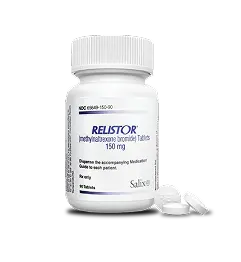Primary endpoint results:
More patients met the primary endpoint of mean percentage of dosing days that resulted in an RFBM within
4
hours
with RELISTOR
during weeks 1 to 42,§
of dosing days in the RELISTOR 450 mg/day treatment group (n=200)2
VS
of dosing days in the placebo group (n=201)2
Percentages indicative of the number of patients who met the primary endpoint (P<.0001)2

RFBM, rescue-free bowel movement.
§The primary endpoint was the mean percentage of dosing days resulting in a SBM within 4 hours of dosing during the 4-week, double-blind period compared with placebo.2
Additional finding (non-primary or secondary endpoint)
24% of patients experienced a SBM within 4 hours of the first dose of RELISTOR (450 mg/day) oral tablets vs placebo (8%)2
SBM within 4 hours of the first dose was an exploratory endpoint. No conclusions about efficacy can be drawn from these descriptive data because they are results from exploratory endpoints2
Convenient once-daily oral therapy1
Three (3) 150-mg tablets (450 mg total)
RELISTOR therapy should be continued only during opioid use1

Not actual size.

Not Actual Size.
RELISTOR subcutaneous injection provides OIC treatment for patients with advanced illness or pain caused by active cancer who require opioid dosage escalation for palliative care1
RELISTOR tablets have a well-established safety profile1
Most common adverse reactions
In the 4-week, double-blind, placebo-controlled period of the clinical study in patients with OIC and CNCP (n=401) (Study 1)1
| ADVERSE REACTIONS|| | RELISTOR TABLETS (n=200) |
PLACEBO (n=201) |
|---|---|---|
| ABDOMINAL PAIN¶ | 14% | 10% |
| DIARRHEA | 5% | 2% |
| HEADACHE | 4% | 3% |
| ABDOMINAL DISTENTION | 4% | 2% |
| VOMITING | 3% | 2% |
| HYPERHIDROSIS | 3% | 1% |
| ANXIETY | 2% | 1% |
| MUSCLE SPASMS | 2% | 1% |
| RHINORRHEA | 2% | 1% |
| CHILLS | 2% | 0% |
||Adverse reactions occurring in at least 2% of patients receiving 3 RELISTOR 150-mg tablets (450 mg total) once daily and at an incidence greater than placebo.1
¶Includes abdominal pain, upper abdominal pain, lower abdominal pain, abdominal discomfort, and abdominal tenderness.1
Adverse reactions of abdominal pain, diarrhea, hyperhidrosis, anxiety, rhinorrhea, and chills may reflect symptoms of opioid withdrawal1
For additional Important Safety Information, please see below
REFERENCES: 1. RELISTOR [prescribing information]. Bridgewater, NJ: Salix Pharmaceuticals. 2. Rauck R, Slatkin NE, Stambler N, et al. Randomized, double-blind trial of oral methylnaltrexone for the treatment of opioid-induced constipation in patients with chronic noncancer pain. Pain Pract. 2017;17(6):820-828.



